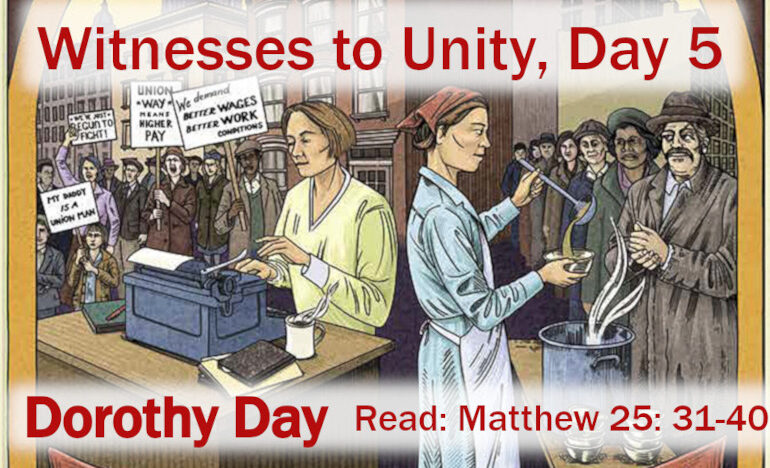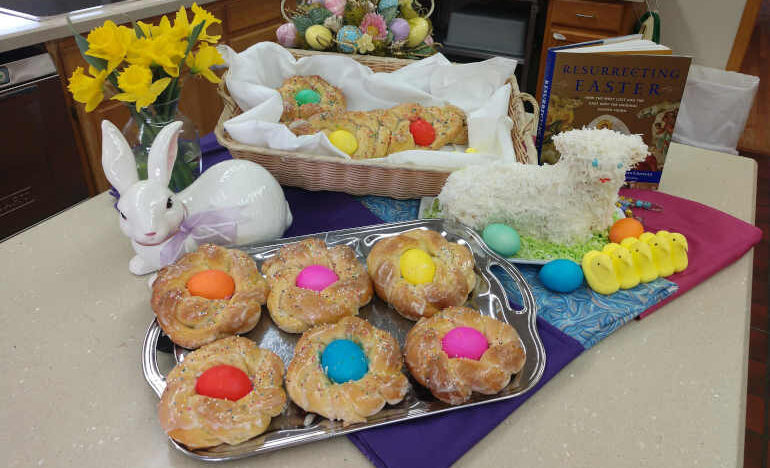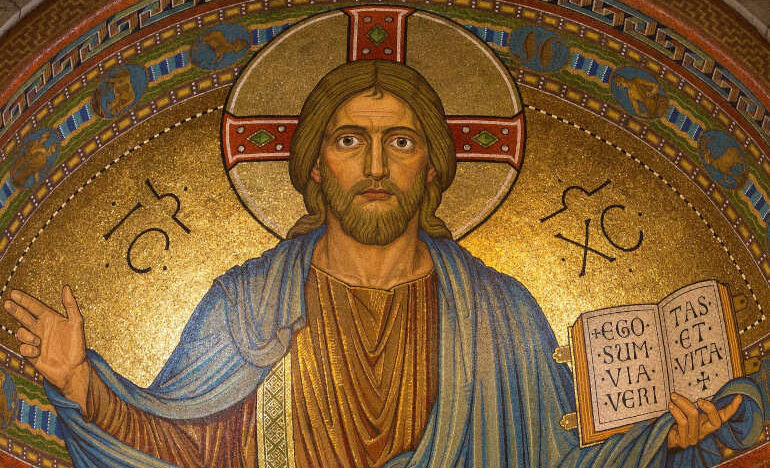Witnesses to Unity. Day 5: Dorothy Day

An Octave of Prayers for the Week of Prayer for Christian Unity
Welcome to Day Four of a Week of Prayer for Christian Unity, brought to you by three Catholic spirituality centers. We invite you to pray with us as we post short prayers and reflections based the witness of eight ecumenical leaders, for each of the eight days.
The spirituality centers are the Marillac Center in Leavenworth, Kansas, the Sophia Center in Atchison, Kansas and Precious Blood Renewal Center in Liberty, Missouri.
We encourage you to share these prayers with members of your family and circle of acquaintances, including those who belong to another faith tradition.
Together, let us pray. (pause)
A reading from the Gospel of St. Matthew 25: 31-40
“When the Son of Man comes in his glory, and all the angels with him, he will sit on his glorious throne. All the nations will be gathered before him…
“Then the King will say to those on his right, ‘Come, you who are blessed by my Father; take your inheritance, the kingdom prepared for you since the creation of the world. For I was hungry and you gave me something to eat, I was thirsty and you gave me something to drink, I was a stranger and you invited me in, I needed clothes and you clothed me, I was sick and you looked after me, I was in prison and you came to visit me.’
“Then the righteous will answer him, ‘Lord, when did we see you hungry and feed you, or thirsty and give you something to drink? When did we see you a stranger and invite you in, or needing clothes and clothe you? When did we see you sick or in prison and go to visit you?’
“The King will reply, ‘Truly I tell you, whatever you did for one of the least of these brothers and sisters of mine, you did for me.’ ”
Dorothy Day
Dorothy Day, founder of the Catholic Worker movement, was born in Brooklyn, New York, Nov. 8, 1897. In 1916, she found a job as a reporter for The Call, the city’s only socialist daily. She covered rallies and demonstrations and interviewed people ranging from butlers to revolutionaries. She next worked for The Masses, a magazine that opposed American involvement in the European war. In September, the Post Office rescinded the magazine’s mailing permit. Federal officers seized back issues, manuscripts, subscriber lists and correspondence. Five editors were charged with sedition.
In November 1917, Dorothy went to prison for being one of forty women in front of the White House protesting women’s exclusion from voting. At the rural workhouse where they were jailed, the women were roughly handled and responded with a hunger strike. Finally, they were freed by presidential order.
As a child Dorothy attended services at an Episcopal Church. As a young journalist in New York, she would sometimes make late-at-night visits to St. Joseph’s Catholic Church on Sixth Avenue. In Chicago, her roommates were devout Catholics. She saw the Catholic Church as “the church of the immigrants, the church of the poor.”
Dorothy’s life took on new meaning on March 3, 1927 when her daughter, Tamar Theresa Day was born. When Dorothy and Tamar were baptized into the Catholic Church, she began discerning how to bring together her religious faith and her radical social values.
In the winter of 1932, Day met Peter Maurin, a French immigrant 20 years her senior. Maurin, a former Christian Brother, had left France for Canada in 1908 and later made his way to the United States. It seemed to her he was an answer to her prayers, when he encouraged her to start a paper to publicize Catholic social teaching and promote steps to bring about the peaceful transformation of society. Dorothy Day and Peter Maurin believed that “God meant things to be much easier than we have made them. We want to build a society where it is easier for people to be good.”
For the first half year The Catholic Worker was only a newspaper, but as winter approached, homeless people began to knock on her door. Maurin’s essays in the paper were calling for renewal of the ancient Christian practice of hospitality to those who were homeless. This was the beginning of the Catholic Worker movement.
The Catholic Worker Movement is a collection of autonomous communities. Its aim is to “live in accordance with the justice and charity of Jesus Christ.” One of its guiding principles is hospitality towards those on the margin of society. To this end, the movement claims over 240 local Catholic Worker communities providing social services in its own way, suited to its local region.
The movement campaigns for nonviolence and is active in opposing both war and the unequal global distribution of wealth. The Catholic Worker newspaper is still published by the two Catholic Worker houses in New York City and still sells for a penny a copy.
Day died November 29, 1980. Her path to formal canonization in the Catholic Church began in 2000 when after receiving petitions from people in his archdiocese, Cardinal O’Connor of New York Cardinal O’ Connor requested that the Congregation for the Causes of Saints in the Vatican consider her canonizetion, and he personally appealed to Pope John Paul II. Day received the title “Servant of God,” the first step in the canonization process.
Take a minute of silence now, and reflect:
- Where do you see the Holy Spirit at work, uniting us to live the justice and charity of Jesus Christ, and to offer hospitality towards those on the margins of society?
- How can you join in this work?
Then pray:
United in the justice and charity of Jesus Christ, together let us pray:
For those deprived of their human needs, and their human rights that they may be given the dignity which God confers on all. We pray to the Lord: Lord, hear our prayer.
For all who are forgotten or thrown away, especially for the poor, the sick and the aged that God might change our hearts and move us to love them as the image of Christ. We pray to the Lord: Lord, hear our prayer.
For all who are lonely or afraid – for teenagers on the street, old people in nursing homes, prisoners with no one to visit them, and all whom the world has forgotten that Christ might lead us to them. We pray to the Lord: Lord, hear our prayer.
For all who are forgotten or cast off that we might value each human life, as a priceless gift from God. We pray to the Lord: Lord, hear our prayer.
For those who are marginalized that we might cherish the gifts God has given them, and in their lives hear the voice of our loving God; We pray to the Lord: Lord, hear our prayer.
Thank you for praying with us today. Please join us again tomorrow.
All of the prayers in this series can be found here: Witnesses to Unity: Prayers for Christian Unity.
Never miss an article published on the Renewal Center website: Sign up to receive our newsletters.
Watch our introductory video
Learn more about these Catholic Spirituality Centers:
The Marillac Center, the retreat and spirituality center of the Sisters of Charity of Leavenworth, in Leavenworth, Kansas.
The Sophia Center is a ministry of the Benedictine Sisters of Mount St. Scholastica in Atchison, Kansas.
Precious Blood Renewal Center, in Liberty, Missouri, is a ministry of the United States Province of the Missionaries of the Precious Blood, a Catholic religious order.
Photo credit: Detail from the graphic novel Dorothy Day: Radical Devotion, by Jeffry Odell Korgen and Christopher Cardinale. Paulist Press.
We’d Like to Hear from You!
We’d like to know what you think about this article. Send us a comment using the form below. Do you have a suggestion? Is there something you want to learn more about? Send us a note.
Related

Easter Bread (Pane di Pasqua)
By Lucia Ferrara
Easter bread is a fun bread. It’s a fun bread to make with your children, with your family, with neighbors and friends. The tradition of Easter bread dates back centuries and comes from many parts of the world.

Easter Sunday, the Resurrection of the Lord
Today’s scriptures tell us how three days changed the world. How have they changed you?
Categories
Assembling God's Puzzle Coffee with Padre Cooking & Spirituality Encounters of the 4th Kind Family Matters Reflections on the Eucharsitic Prayers Spiritual Resources Taize Prayers The Contemplative Life Traveling with Pilgrims of Hope Uncategorized Videos Week of Prayer for Uhristian Unity When you need a little help
